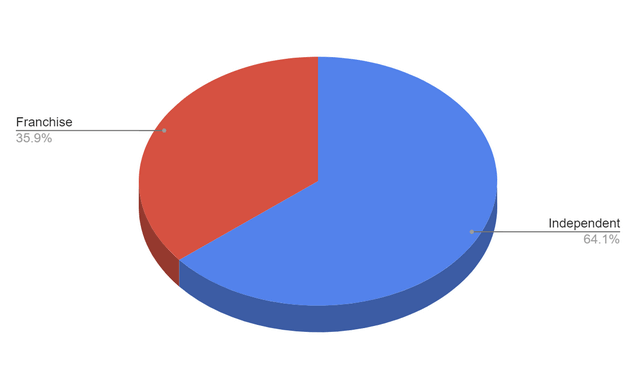Automotive Dealer Websites Providers: Market Data Analysis
Top Two Dealers Website Providers Capture Half of the Market,
Independent Dealerships Dominate
Car shopping platforms, also known as online marketplaces for buying and selling cars, have grown steadily in popularity in recent years. These platforms provide a one-stop shop for car buyers, allowing them to search for vehicles, compare prices, and make purchases all from the comfort of their own homes. Franchises and independent dealerships list their inventories on online marketplaces to expand their reach beyond their local market and tap into a wider pool of potential buyers.
According to a market data analysis provided by VinAudit.com, based on 100K dealers websites in market data feeds data file, approximately 50 percent of dealerships in the US are on two popular marketplaces. CarsforSale.com offers a range of features designed to help dealerships increase their online visibility and connect with buyers. The other platform is Dealers.com which offers a comprehensive suite of digital marketing tools, including website design and management, social media marketing, and search engine optimization.

Selecting the right online marketplace: Factors considered by dealerships
Dealers.com and CarsforSale.com have established a reputation as credible platforms with a track record of success, and they offer a wide range of services that can be attractive to dealerships looking for a comprehensive solution to their online presence. These platforms provide a user-friendly experience for dealerships and consumers, with easy-to-use inventory management systems, responsive design, and mobile optimization.
Both platforms allow for the customization of dealership websites, which can help dealerships differentiate themselves from their competitors. Additionally, pricing is competitive and can be tailored to the specific needs of individual dealerships. Dealerships can also benefit from the strong customer support provided by these platforms, with dedicated account managers available to assist dealerships with any issues they may encounter.
How Independent and Franchise Dealerships Market Vehicles Online
Both independent and franchise dealerships use online platforms to market their vehicles. Independent dealerships are not affiliated with any specific car manufacturer while franchise dealerships are authorized by a specific car manufacturer to sell their vehicles. Their approaches to marketing vehicles may differ based on their size, resources, and unique selling points.
Independent dealerships often rely heavily on online marketplaces to generate leads and drive sales. They may use third-party marketplaces as well as their websites and social media accounts to advertise their inventory.
Franchise dealerships, on the other hand, may have access to more resources and a wider range of marketing channels. They may use third-party marketplaces, their website, and social media to advertise their inventory, but they may also have access to manufacturer-sponsored websites and platforms.
Overall, online marketplaces like CarsforSale.com and Dealers.com have had a significant impact on both independent and franchise dealerships, providing increased visibility, improved customer experience, increased competition, and new opportunities for leveraging technology and data.
Why more independent dealerships are on online marketplaces
Based on the same market data, VinAudit also found more independent dealerships are selling cars on online marketplaces compared to franchise dealerships. What are the possible reasons behind this finding?

Independent dealerships enjoy greater flexibility to test new sales channels and explore online marketplaces as they are not constrained by manufacturer guidelines. Their lower overhead costs give them the advantage of investing more in online marketing efforts.
Online marketplaces offer an attractive option for independent dealerships that lack the same level of brand recognition as franchise dealerships. These platforms create a level playing field for all dealerships, regardless of their size or brand recognition. Additionally, online marketplaces provide a larger audience of potential customers searching for specific makes and models of vehicles, resulting in greater exposure for independent dealerships. Furthermore, online marketplaces streamline the process for dealerships to list their inventory, manage leads, and communicate with potential customers, enabling them to participate in online sales channels without making substantial investments in technology and infrastructure.
It’s important to note that franchise dealerships are also adopting online sales strategies and may narrow the gap with independent dealerships over time.
Market data and online platforms: What’s in it for dealerships
Dealerships can learn from the growing trend of selling vehicles online via marketplaces like Dealers.com and CarsforSale.com. To position for success in the rapidly-evolving automotive market, dealerships must embrace online sales, focus on the customer experience, leverage data and analytics, collaborate with online marketplaces, and stay competitive.
The availability of market data revealing these trends demonstrates the importance of tracking and analyzing market trends and the behavior of competitors in the industry. By staying informed about market shifts and competitors’ strategies, dealerships can adjust their approaches to better position themselves for success.
